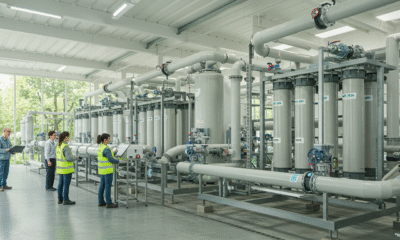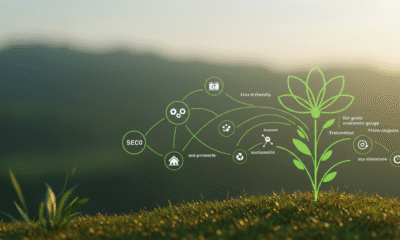

Environment
Ecology In Logistics: Caring for The Environment In Transportation
We have heard a lot of concerning news about the state of the planet in recent months. Fortunately, there is some good news on the horizon as well. Earlier this week, a bipartisan group of senators announced a bill that would help limit exposure to forever chemicals. We have also found a report showing a growing number of farmers are trying new approaches to help limit their impact on the planet.
There is a growing shift in almost every industry to practice sustainability. This is going to be important, as consumers and regulators around the globe put more pressure on companies to be better stewards of the planet.
The transportation industry is among those focused on improving sustainability. Keep reading to learn more.
Increased Focus on Sustainability in the Transportation Industry
The increase in environmental awareness in the business world is paving the way for environmentally friendly measures. As in other fields, logistics also pays increasing attention to environmental protection. Green logistics, which includes a range of practices such as using renewable energy and reducing carbon emissions, is becoming an essential aspect of responsible operation in the industry. It is important to understand what green logistics is, why it is becoming increasingly important, and its benefits.
What is green logistics?
Green logistics, or bringing green consciousness to the heart of the logistics sector, is an approach that defines the future of the industry. It allows companies to balance efficiency and ecology, seeking to optimize both environmentally and economically.
As in other areas, logistics operations can lead to adverse environmental consequences. These issues include, in particular, energy consumption and the choice of transportation modes, which can harm the planet—an ecological approach in logistics results in the design of transportation systems with environmental protection in mind. In addition, minimizing packaging and waste, controlling emissions and noise levels, and using renewable energy are steps to make the logistics industry more environmentally friendly.
Why is green logistics necessary?
Green logistics enables companies to reduce their environmental impact and make the transportation industry greener. Moreover, energy efficiency and waste minimization allow companies to use their financial resources more consciously and sustainably.
In the context of ecology in logistics, it is vital to consider the following aspects:
- Intermodal transportation: integrating various modes of transportation opens up opportunities for green solutions.
- Reducing the carbon footprint: reducing reliance on CO2-intensive modes of transportation is critical to green logistics.
- Use of green energy: preference for vehicles powered by green energy sources is essential in choosing transportation modes.
- Recycling and packaging management: a responsible approach to the packaging materials used, recycling and reducing them, is one of the pillars of sustainable logistics.
Intermodal transportation
Intermodal transport, which combines different transportation methods without reloading cargo from a container, is an example of sustainable solutions in the transportation industry. For those looking for efficient and environmentally friendly shipping options, a valuable choice is to partner with a trusted partner specializing in intermodal transportation, such as AsstrA, which offers a combination of land, sea, air, and rail transportation.
Reducing your carbon footprint
Implementing a green strategy in logistics includes measures to reduce the carbon footprint. One significant effort is to analyze the vehicles used in transportation in terms of fuel efficiency. Using vehicles with lower fuel consumption and lower carbon emissions is an expression of environmental care. In addition, switching to more fuel-efficient vehicles allows transportation companies to reduce fuel costs.
Use of green energy
The choice of fuel used in vehicles significantly impacts the environment. Solar-powered, electric, or hybrid vehicles are examples of the use of green energy. Transportation companies’ concern for using renewable energy sources contributes to the increasingly green transportation solutions they offer.
Recycling and packaging management
The use of appropriate packaging plays a crucial role in the provision of transportation services. Packaging materials should be adapted to recycling systems, allowing them to be reused later. Emphasizing the importance of recycling and appropriate packaging methods in the context of green logistics is essential to demonstrate that companies are taking responsible action in this area.
Sustainable supply chain management
Sustainable supply chain management includes a range of green practices:
- Green manufacturing: environmental aspects are considered a priority element throughout production.
- Green purchasing: when selecting raw materials for production, priority is given to their environmental performance and recyclability.
- Green packaging: use of environmentally friendly packaging materials, minimization of packaging consumption, and preference for reusable packaging.
- Green logistics: implementing green solutions in all aspects of transportation and logistics.
What are the advantages of green logistics?
A green approach in logistics has numerous benefits for both businesses and the environment, which can be summarized as follows:
- Adopting green practices reduces activities that are harmful to the environment.
- Improved energy efficiency, waste reduction, and fuel savings enable companies to reduce operating costs.
- Companies focusing on green logistics practices build their reputation and image as responsible companies in the sector.
- More efficient and economical use of resources prevents waste and contributes to preserving natural reserves.
- Green strategies allow companies to compete more effectively in the industry, highlighting their innovation and social responsibility.






























